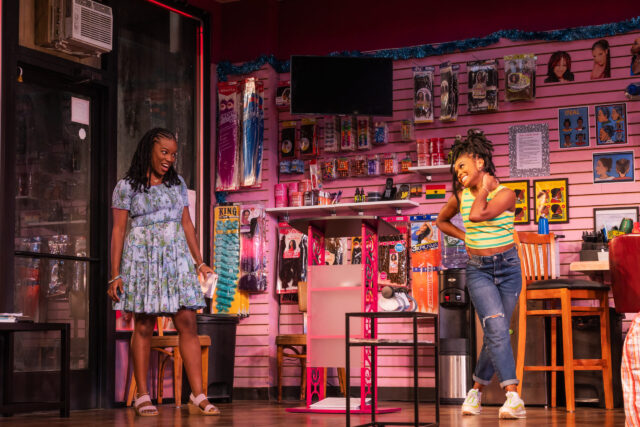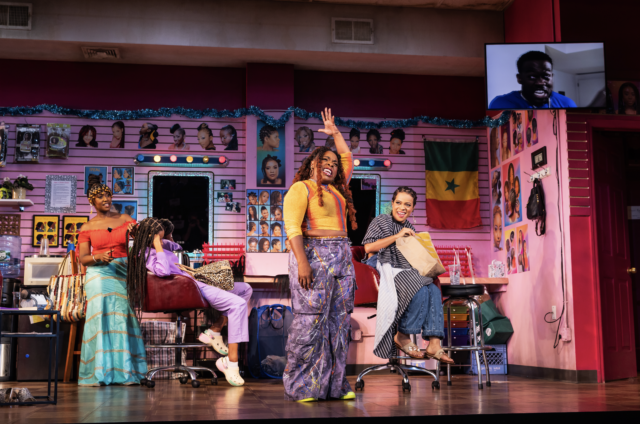
Marie (Dominique Thorne, right) receives an unexpected visitor in Jaja’s African Hair Braiding (photo © Matthew Murphy, 2023)
JAJA’S AFRICAN HAIR BRAIDING
Samuel J. Friedman Theatre
261 West Forty-Seventh St. between Broadway & Eighth Ave.
Tuesday – Sunday through November 19, $74-$205.50
www.manhattantheatreclub.com
“I feel like I moved in for the day,” Jennifer (Rachel Christopher) says in Jocelyn Bioh’s Broadway debut, Jaja’s African Hair Braiding. An aspiring journalist, Jennifer is a kind of doppelganger for the audience; she arrived just as Jaja’s hair salon on the corner of 125th St. and St. Nicholas Ave. in Harlem opened, asked for long micro braids, and has spent the entire morning and afternoon with Miriam (Brittany Adebumola), an optimistic stylist from Sierra Leone. It’s Jennifer’s first time in the shop, and she carefully watches from her chair to the side as people come and go and the stylists laugh, argue, gossip, and wonder what’s next for them. Just as Jennifer starts to feel part of this tight-knit community, so does the audience.
It’s an auspicious, and very hot, July day in 2019, and Senegalese owner Jaja (Somi Kakoma) is getting married that night. Her eighteen-year-old daughter, wannabe writer Marie (Dominique Thorne), is managing the shop and the stylists, who can be a handful: the Ghanaian Sista Bea (Zenzi Williams), a busybody who thinks she’s better than the others and is hoping to open her own salon; the Senegalese Aminata (Nana Mensah), who loves hanging around the shop, especially while she’s having issues with her husband; Miriam, a patient and agreeable young woman with a surprise secret; and the Nigerian Ndidi (Maechi Aharanwa), a fast, talented, fun-loving braider who the older Bea is jealous of.
Over the course of the day, a variety of customers come and go. The nasty and rude Vanessa (Lakisha May) complains about nearly everything, from the way the others look at her to the chair. Chrissy (Kalyne Coleman) is a cheerful young woman who wants to look like Beyoncé. Sheila (May) is a businesswoman who can’t stop talking on her phone. Laniece (Coleman) is a local DJ. And Michelle (Coleman) is a nervous mother who has made an appointment with Ndidi instead of her usual stylist, Bea, who is furious and feels betrayed.
Also stopping by are a series of men, including Franklin the Sock Man, Olu the Jewelry Man, and Eric the DVD Man, selling their wares, in addition to Aminata’s husband, James (all portrayed by Michael Oloyede).
Shortly after Jaja (Somi Kakoma) arrives, the narrative takes a sharp, unexpected turn, forcing everyone to face a hard dose of contemporary reality.

Jocelyn Bioh’s Jaja’s African Hair Braiding takes place in a Harlem salon (photo © Matthew Murphy, 2023)
In School Girls; Or, The African Mean Girls Play, Bioh, who has appeared in such plays as Suzan-Lori Parks’s In the Blood, Branden Jacobs-Jenkins’s Everybody and An Octoroon, and Jaclyn Backhaus’s Men on Boats, follows a group of young Ghanaian students seeking to be selected as a contestant for Miss Ghana, raising issues of jealousy, fairness, and colorism.
She expands on the concept of Black style in Jaja’s African Hair Braiding, celebrating individuality and woman entrepreneurship while also exploring immigration and the African diaspora in America. In a program note, Bioh explains, “To many people, they are just ‘hair braiding ladies,’ random women people pass by on the street, but to me, they are heroes, craftswomen and artists with beautiful, gifted and skilled hands.” Each character has her hopes and dreams, her fears and desires, that feel real, not cartoonish or pedagogic.
At the center is Marie, who, despite being the youngest, is both friend and mother to the other stylists while figuring out how she can afford to go to college and start up her own life. “You know, I really don’t wanna talk about ANY of this anymore, okay?! I don’t want to talk about school or my mother or her ‘connections’ or whatever you saw on the news!” she blurts out, succumbing to the pressure. “Trust me — this is already all I think about every single day. Every single second! For once, can I just have a day where I come here, do my work — in peace — and go home? Is that okay?!”
The show is lovingly directed by Obie winner Whitney White (soft, On Sugarland), balancing uproarious comedy and wit with sincerity and grace. The ensemble cast is outstanding, led by Thorne as Marie, who imbues her with an inner strength that is wise beyond her years yet existing on a knife’s edge. Adebumola is engaging as the warm and caring Miriam, Mensah is hilarious as Aminata, and Oloyede pulls off quite a feat in portraying all four male characters.
Dede Ayite nails the costumes, giving identity, dignity, and humor to each of the women. The effective lighting is by Jiyoun Chang, with lively sound and original music by Justin Ellington. David Zinn’s phenomenal set, a remarkably detailed salon that essentially puts the audience right in Jaja’s shop (and receives its own well-deserved applause), and Nikiya Mathis, who is responsible for the spectacular hair and wigs, are stars in themselves.
You won’t mind spending a lot more time in Jaja’s, moving in for a day or more.
[Mark Rifkin is a Brooklyn-born, Manhattan-based writer and editor; you can follow him on Substack here.]